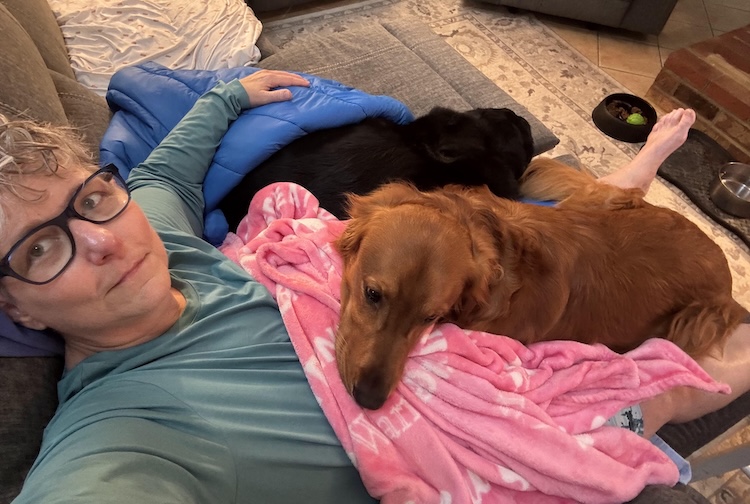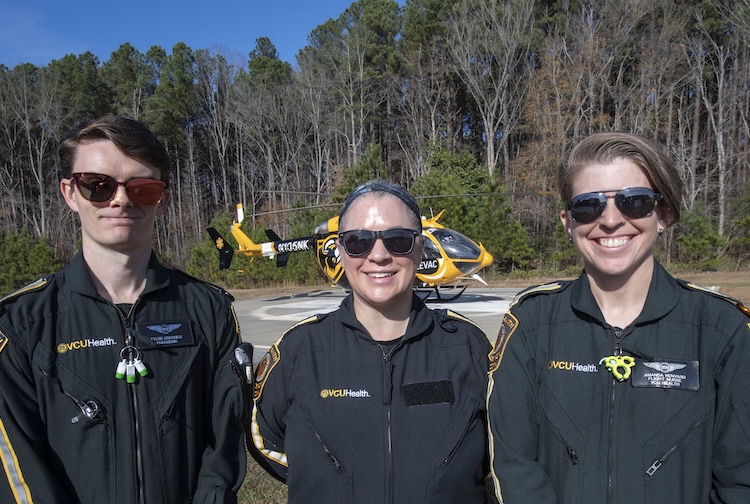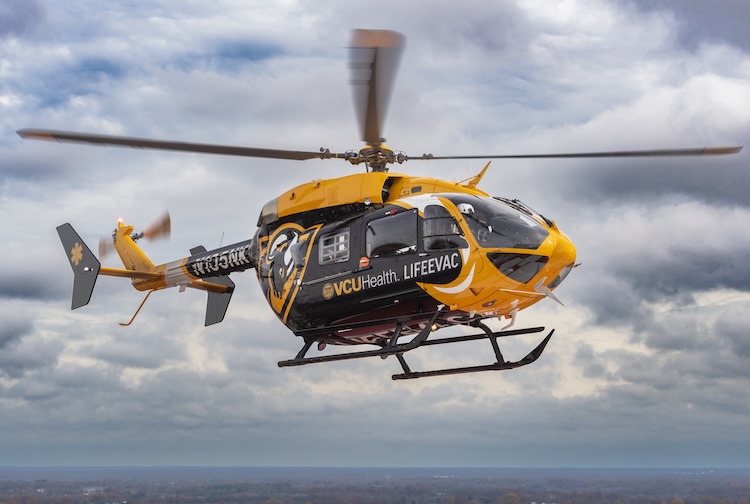VCU Health doctors deliver emergency care on Afghan refugee flights
Volunteer work provided opportunity to practice large-scale emergency medicine.
November 25, 2021 Left to right: Komal Dhir, Leticia Flores and Hala Ashraf (Photo: Thomas Kojcsich, University Marketing)
Left to right: Komal Dhir, Leticia Flores and Hala Ashraf (Photo: Thomas Kojcsich, University Marketing)
By James Shea
Home on maternity leave in August, Leticia Flores, M.D., watched the Afghan refugee crisis unfold on TV.
“I was seeing people pass kids over the fence at the airport, and that broke my heart,” said Flores, an academic hospitalist and assistant professor of medicine at VCU Health. “I wished I could do something.”
Flores, along with several other doctors from VCU Health, received that opportunity. In September, they provided medical services onboard refugee flights headed to the United States.
In August, the Biden Administration activated the Civil Reserve Air Fleet — civilian aircraft used for major national defense emergencies. Eighteen aircraft from American Airlines, Atlas Air, Delta Air Lines and Omni Air were put into service to fly refugees from air bases in Europe and the Middle East to the United States.
As the flights were being organized, Sen. Mark Warner's office contacted the Medical Society of Virginia about the need for volunteer doctors onboard the flights. The society reached out to its membership, and Flores saw an appeal on Facebook. Within days she was on a flight. It was an amazing experience, she said, and she was grateful that she could contribute to a major historical event.
“I am glad that I could help and that I have the support at home to be able to do that,” she said. “It was a wonderful opportunity and inspired me to help immigrants who are already here. They still need help.”
Fellows participate
Besides Flores, several other medical professionals from VCU Health volunteered — including two fellows from the Division of Emergency Medical Services.
Hala Ashraf, D.O., and Komal Dhir, M.D., heard about the flights from Amir K. Louka, M.D., assistant professor in the Department of Emergency Medicine. The fellows study emergency medical services, and the flights were a chance to put their training into practice.
“Emergency Medical Services subspecialty training provides physicians with the skills and knowledge to supervise the care of anyone, anywhere,” Louka said. “That includes treating a diverse group of patients with unique needs at 30,000 feet without consults, X-rays or any of the support we have in the Emergency Department. I was thrilled that our fellows had an invaluable opportunity to learn, serve and lead while participating in such a worthy cause.”
Dhir arrived at Dulles International Airport on Sept. 7 for a flight to Germany. Onboard were air marshals, a few other medical personnel and the flight crew. In Germany, approximately 300 refugees boarded.
The flight had no life-threatening emergencies, Dhir said. The most common complaint was gastrointestinal upset. Dhir estimates she treated approximately 30 patients. One infant had a fever and weak cry, but none had major medical problems.
Passengers were courteous but apprehensive, Dhir said. “There were a lot of mixed emotions from the passengers,” Dhir said. “I think there was a lot of anxiety and fear. A lot of them were not used to flying, so there was definitely some fear during takeoff and landing.”
Both Dhir and Flores were surprised by the children, though. They were mostly calm throughout their flight, playing games and reading.
Ashraf's experience was very different from those of Dhir and Flores. She arrived at the airport on September 10 and boarded the plane. Unfortunately, one of the previous flights had identified someone with measles. United Airlines held Ashraf's flight on the tarmac, trying to decide a course of action.
The plane sat on the tarmac for five hours. It was eventually cancelled, and the refugee flights were suspended. Ashraf returned home and didn't get to participate on another flight.
Keeping the flights moving
The flights were a terrific opportunity to practice emergency medicine, Flores said. Organizers told the volunteer physicians that their main task was to prevent the escalation of a medical situation into a medical emergency, which would require an extra stop along the way.
Flores spent most of her time apart from the refugees. When she engaged passengers, she said, they seemed apprehensive. They also seemed more concerned about their chronic illnesses and fear of flying than any acute problems.
Flores knew that she and the other medical professionals on the flight would never be able to provide adequate care for chronic illnesses with their limited time and resources. And doing so would use up one of their most valuable resource — the translators, who were spread thin helping flight attendants, pilots, passengers and the medical team.
“I realized the more I was in the back of the plane, the more non-urgent complaints there were,” Flores said. “I tried to focus on the goal, which was to avoid diversion for medical emergencies. I reminded myself and my team members that we could do more harm than good by treating non-complaints that we could not adequately assess without a medical translator. My goal was to be there for an emergency — and after eyeballing all the passengers on the tarmac, I knew that I didn't have to go look for emergencies. Emergencies would find me.”
Flores was concerned about a 9-month pregnant woman and a two-day old infant who had been born just prior to the flight. She also saw a refugee who may have had COVID-19. She treated them as best she could on the flight, but none were a major medical emergency.
Flores sent an email to the other doctors in Virginia who were planning to volunteer. She stressed that they needed to stick with the mission's objective and try to limit non emergent practice of medicine to avoid harm.
“In emergency medicine, the goal is to stabilize while minimizing risk, then transferring to an appropriate level of care. We really shouldn't be doing anything else with such limited resources,” Flores said.
Dhir said the flight was a great opportunity to practice many of the skills she acquired during her fellowship.
“This was an awesome and unique opportunity to practice the triage skillset and high volume need for medical care prior to being in the hospital, with limited resources,” she said.




